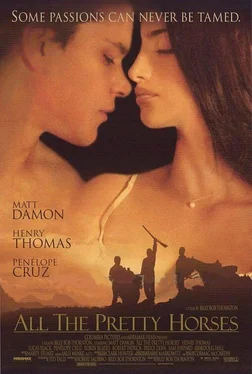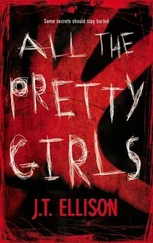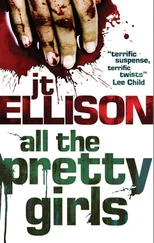Cormac McCarthy - All The Pretty Horses
Здесь есть возможность читать онлайн «Cormac McCarthy - All The Pretty Horses» весь текст электронной книги совершенно бесплатно (целиком полную версию без сокращений). В некоторых случаях можно слушать аудио, скачать через торрент в формате fb2 и присутствует краткое содержание. Жанр: Современная проза, на английском языке. Описание произведения, (предисловие) а так же отзывы посетителей доступны на портале библиотеки ЛибКат.
- Название:All The Pretty Horses
- Автор:
- Жанр:
- Год:неизвестен
- ISBN:нет данных
- Рейтинг книги:4 / 5. Голосов: 2
-
Избранное:Добавить в избранное
- Отзывы:
-
Ваша оценка:
All The Pretty Horses: краткое содержание, описание и аннотация
Предлагаем к чтению аннотацию, описание, краткое содержание или предисловие (зависит от того, что написал сам автор книги «All The Pretty Horses»). Если вы не нашли необходимую информацию о книге — напишите в комментариях, мы постараемся отыскать её.
In the spring of 1948 on a small Texas ranch, sixteen year old John Grady Cole attends the funeral of his grandfather, with whom he has lived since his parents' separation. The grandfather's ranch has been left to John Grady's mother, a small-time actress who has no interest in it and will sell it. John Grady's father, psychologically damaged by World War II and now physically ill as well, tells his son goodbye. With no apparent future in Texas, and sensing the threat of the new era to the traditional life he values, John Grady urges his old friend Rawlins to accompany him to Mexico. There, John Grady will find that his innocence, or ignorance, will ultimately lead him close to destruction.
Before reaching the border they meet Jimmy Blevins, a dangerous young boy on a magnificent horse. Even though Cole and Rawlins do not trust Blevins and are sure his horse is stolen, they allow him to join them despite their doubts. As they ride into Mexico, they realize that they are no longer in a world that they can understand. When Blevins' clothes and horse disappear during a thunderstorm, they search a nearby Mexican town, where they find the clothes and finally the horse. In spite of Rawlins' voiced forebodings, Blevins steals the horse back, and as John Grady and Rawlins flee the town Blevins gallops past them, pursued by armed men.
John Grady and Rawlins ride south, coming at last to a ranch, the Hacienda de Nuestra Senora de la Purisima Conception. As they talk with the vaqueros about the possibility of employment, John Grady sees a beautiful girl on a black horse, Alejandra, the daughter of hacendado Don Hector Rocha y Villareal. The heir of an aristocratic family, Don Hector is avidly interested in breeding wild mountain horses with his own stock, so John Grady and Rawlins join the vaqueros; John Grady amazes everyone with his ability to break the wild horses quickly and gently.
When Don Hector questions Cole about his past, he omits the episode with Blevins and the fact that he and Rawlins may now be wanted as accomplices in Blevins's horse theft. Concerned about his blossoming relationship with Alejandra, Duena Alfonsa, Don Hector's aunt and Alejandra's godmother, warns John Grady away from the rebellious girl, and informs him that Don Hector will never allow her to marry an American, especially a poor one. But Alejandra comes to him one night and they become lovers.
A few days later John Grady and Rawlins are arrested and taken to a jail in Encantada, where Blevins is already imprisoned for the murder of three men. While the three Americans are transported to the state prison at Saltillo, Blevins is taken from the group and shot. At the prison, they are questioned and beaten, and Rawlins is injured seriously. John Grady, attacked by another prisoner, whom he must kill, learns that evil exists not only in the world but in himself. When he and Rawlins are suddenly released as mysteriously as they were arrested, Rawlins returns to Texas.
But John Grady goes back to La Purisima to search for Alejandra, who is not there. Once again Duena Alfonsa makes clear to him the impossibility of the match. She tells her own story of the power of ignorance and evil (her love for a man who was killed by a mob after helping depose the dictator Diaz) and of her determination to protect Alejandra. Although John Grady does meet Alejandra one last time at a hotel in Zacatecas, it is only as a farewell: she chooses her family's approval (and perhaps their money). In pain, Cole returns to Encantada where he finds Blevins's horse, innocent like all animals and yet the cause of much death and loss. John Grady captures both the horse and the brutal police captain who shot Blevins, and heads homeward. En route, the captain is seized by brigands with a score to settle with him, and John Grady finally returns to Texas.
He finds even less there than before: his father and his childhood nurse are both dead. He rides on with the stolen horse, seeking to restore it to its rightful owner. John Grady has learned, but not yet enough; he has left home and returned a changed man, but there is no home to receive him. All the Pretty Horses is a hero's quest without a neat resolution, a book in which the strange light of mythic struggles shines through the quick-paced adventure.
The Border Trilogy continues with Volume Two, The Crossing, and concludes with the third volume, Cities of the Plain.












